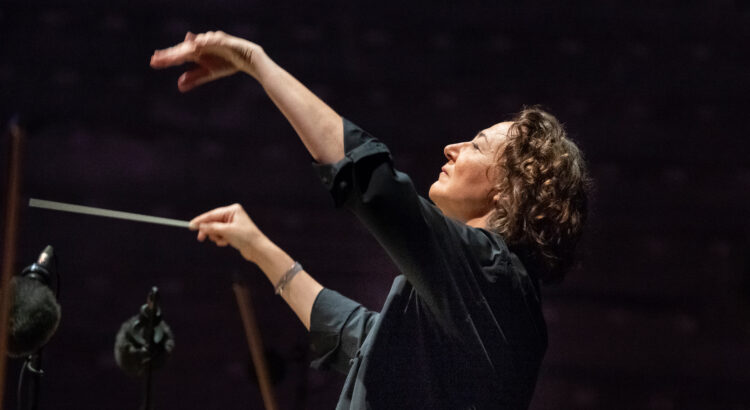After Friday’s phenomenal concert, I was almost worried that Saturday’s concert by the Philadelphia Orchestra could not possibly measure up to the impossibly high standard of the previous evening. However, as I should have expected, the Philadelphia Orchestra did not disappoint! The second evening’s program included Sinfonia (for Orbiting Spheres) by Missy Mazzoli, Violin Concerto No. 1 in g minor, Op. 26 by Max Bruch, and Symphony No. 9 in C Major, D. 944 by Franz Schubert, and was conducted by Nathalie Stutzmann, Principal Guest Conductor of the Philadelphia Orchestra.
Ms. Stutzmann presided over the orchestra with a joyful and dynamic ease, and I must note how exciting it was to see a professional orchestra concert conducted by a woman – an unfortunately rare occurrence, and something that I had never actually experienced before this concert. Indeed, in addition to her position with the Philadelphia Orchestra, Ms. Stutzmann (who is also an accomplished contralto singer) was recently named the next music director of the Atlanta Symphony (beginning with the 2022-23 season), making her only the second woman ever (and only woman currently) to lead a major orchestra in the United States.
The program was similarly exciting. I was not familiar with contemporary composer Missy Mazzoli, whose ethereal, atmospheric piece Sinfonia (for Orbiting Spheres) opened the concert. Mazzoli aptly describes her composition as being “music in the shape of a solar system, a collection of rococo loops that twist around each other within a larger orbit,” and “a piece that churn and roils, that inches close to the listener only to leap away at breakneck speed.” Threads of music wove in and out, ebbing and flowing in a way that was simultaneously challenging, fascinating, and enjoyable.
Next, the Bruch Violin Concerto No. 1 in g minor, Op. 26 featured violin soloist David Kim, Concertmaster of the Philadelphia Orchestra. His interpretation of the piece, a standard for violinists, highlighted exquisite control, technical proficiency, and expressivity that was a privilege to witness. As I often gravitate toward the slow movements of pieces, I especially enjoyed the concerto’s second movement, the Adagio. The violin sings above the orchestra throughout, and the movement ends superbly peacefully.
Finally, after an intermission, Schubert’s Symphony No. 9 in C Major, D. 944 was a fitting close to an evening of excellent music. As with Friday evening’s program, it showcased the Philadelphia Orchestra’s rich sound, and particularly their world-class string sections, in a way that listening to recordings cannot capture.
The only disappointment about Saturday’s concert by the Philadelphia Orchestra was that, unlike Friday night, it did not include an encore!


